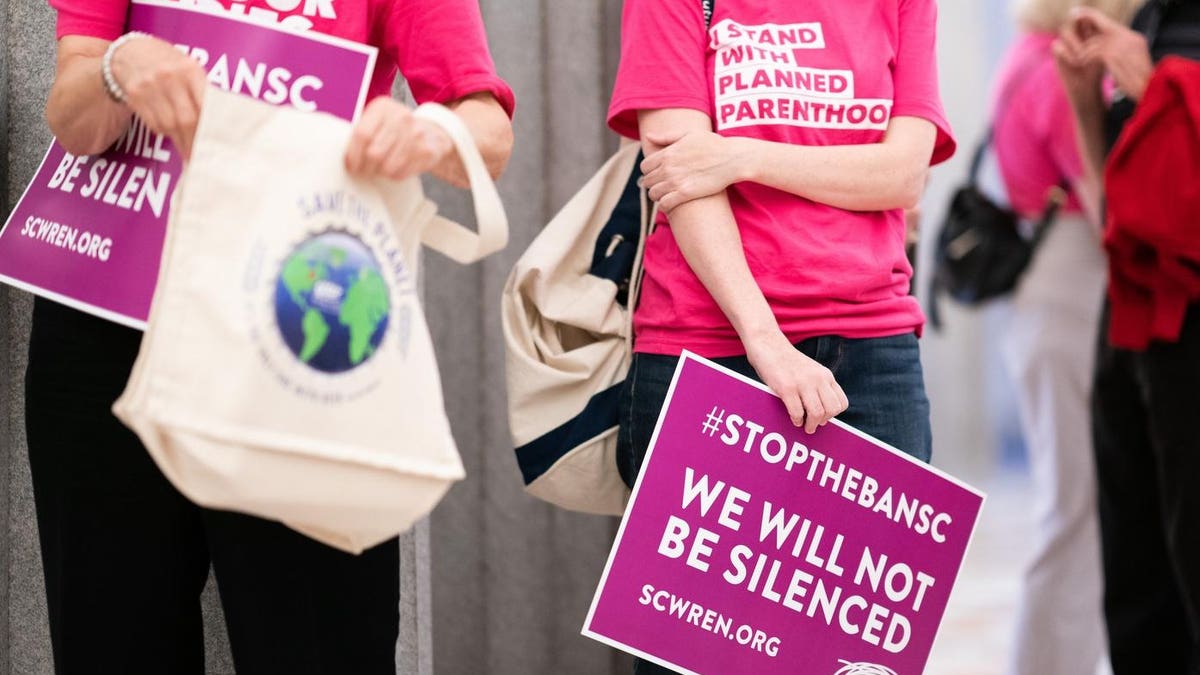Topline
The South Carolina Supreme Court upheld the state’s six-week abortion ban Wednesday in a 3-2 ruling—after previously striking down a similar ban months earlier—putting the ban into effect and further cutting off access to abortion in the South following the overturning of Roe v. Wade.
Key Facts
The state Supreme Court ruled South Carolina’s Fetal Heartbeat and Protection from Abortion Act is constitutional, meaning the ban will immediately take effect, throwing out a lower court ruling that stopped the law from taking effect after state legislators passed it in May.
The ruling came after the state Supreme Court struck down a previous version of the six-week ban in January, declaring the law unconstitutional, which led lawmakers to pass a revised version of the bill.
The justice who wrote the opinion in that 3-2 decision, Justice Kaye Hearn, has now retired and was replaced on the court, which is now made up entirely of men.
Justice John W. Kittredge wrote for the court that the 2023 law was “materially different” enough from the previous law to justify the court reversing course, pointing to new additions in the law like adding reasoning for lawmakers’ judgment to ban abortion after a “fetal heartbeat” is detected—which doctors criticize as being medically misleading—and adding protections for contraception access and Plan B.
Kittredge wrote the law doesn’t violate South Carolina’s constitutional right to privacy because that only outlaws “unreasonable invasions of privacy,” and in the legislature’s judgment, banning abortion after six weeks is not “unreasonable.”
The ban “takes away people’s ability to control what happens to their bodies, forcing many South Carolinians to remain pregnant against their will,” Jenny Black, CEO of Planned Parenthood South Atlantic, one of the plaintiffs behind the lawsuit, said in a statement Wednesday.
Crucial Quote
“To be sure, the 2023 Act infringes on a woman’s right of privacy and bodily autonomy,” Kittredge wrote, but “the legislature has made a policy determination that, at a certain point in the pregnancy, a woman’s interest in autonomy and privacy does not outweigh the interest of the unborn child to live. As a Court, unless we can say that the balance struck by the legislature was unreasonable as a matter of law, we must uphold the Act.”
Big Number
7,256. That’s the number of abortions performed in South Carolina in 2022, according to the South Carolina Department of Health and Environmental Control. That’s up from 6,279 in 2021 and 5,468 in 2020—even as the state temporarily restricted abortion for six weeks before the first law was blocked in court—as the state had become a key access point for abortion in the South.
What To Watch For
Florida, which is now one of the few states in the South where abortion is permissible after six weeks—the state has a 15-week ban in place—could soon follow in South Carolina’s footsteps. The state has enacted a six-week abortion ban, but it can only take effect if the Florida Supreme Court reverses an earlier ruling that found abortion rights are protected in the state Constitution. It’s still unclear when the court could rule, but a majority of the court was appointed by Florida Gov. Ron DeSantis (R), suggesting they could be favorable to upholding his policy.
Key Background
The U.S. Supreme Court’s overturning of Roe v. Wade in June 2022 has sparked a wave of state-level abortion bans, particularly in the South. With Wednesday’s ruling, 17 states now have strict abortion bans in place, with Georgia and South Carolina banning the procedure after six weeks and the rest completely outlawing it. The Supreme Court ruling there’s no federal right to an abortion has led abortion clinics and abortion rights advocates to turn to state courts to fight bans, arguing as in South Carolina that laws violate state constitutions, including their rights to privacy. The legal challenges have resulted in a number of state bans being halted, with laws currently blocked in court in Iowa, Ohio, Utah and Wyoming.
Judge Pauses South Carolina’s 6-Week Abortion Ban—For Now (Forbes)
South Carolina Prepares To Ban Abortions After 6 Weeks—But Court Challenges Could Follow (Forbes)
100 Days Since Roe V. Wade Was Overturned: The 11 Biggest Consequences (Forbes)
How Americans Really Feel About Abortion: The Sometimes Surprising Poll Results One Year After Roe Overturned (Forbes)
Roe V. Wade Overturned One Year On: Here’s Where The Money’s Going (Forbes)
Read the full article here





